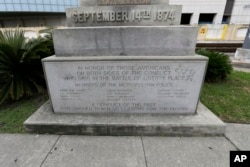Two federal agencies say they won't try to block the city of New Orleans' attempt to remove a monument to an 1874 white supremacist revolt against Louisiana's federally backed post-Civil War government.
In court papers filed Friday, the U.S. Department of Housing and Urban Development and the Advisory Council on Historic Preservation say they have "no further legal or programmatic interest" in preserving the monument. Both asked to be dismissed from the lawsuit brought by people who don't want the city to remove that and three other monuments.
"The Liberty Monument is not federal property, nor will the city expend federal funds for the proposed removal of the Liberty Monument," federal attorneys wrote, saying the judge didn't need to require or prohibit the agencies to do anything.
In December, the New Orleans City Council voted to remove the obelisk commemorating the Battle of Liberty Place, as well as statues of Confederate Gen. Robert E. Lee, Confederate President Jefferson Davis and Confederate Gen. P.G.T. Beauregard.
Declared nuisances
At Mayor Mitch Landrieu's urging, the council voted 6-1 to declare each a nuisance. In March, the 5th U.S. Circuit Court of Appeals froze the removal of the monuments while appeals are pending.
The Liberty Monument had been the target of a previous lawsuit after the city removed it from a location on the main downtown thoroughfare of Canal Street during a federally financed paving project in 1989. The city didn't put the monument back up, and Francis Shubert sued in 1991, alleging the city was violating federal historic preservation rules.
In 1992, New Orleans agreed in a federal consent decree with Shubert and the agencies to re-erect the Liberty Monument.
The city placed it in an obscure spot on a side street near the entrance to a parking garage. Friday's filing says there's no continuing legal requirement that it remain.
"The order does not set a requirement about keeping the Liberty Monument at its relocated place," wrote Javier Marques, a lawyer for the historic preservation council, in a June 3 letter filed with the motions.
Confederate symbols
The other three statues are in much more prominent locations, with Lee towering on a 60-foot marble column above Lee Circle near the central business district, and Beauregard enshrined on a pedestal in a traffic circle at an entrance to City Park.
Polls have found public opinion is split on the monuments, with most African American residents supporting their removal and most white residents opposing it. New Orleans is majority-black.
Backlash against the plan brought death threats, intimidation against removal contractors and even what may have been the intentional torching of a contractor's Lamborghini.
The Liberty Monument has been a continuing magnet for demonstrations and vandalism. It honors the Crescent City White League's attempt to overthrow a biracial Reconstruction government in New Orleans after the Civil War. That attempt failed, but white supremacist Democrats later took control of the state.





